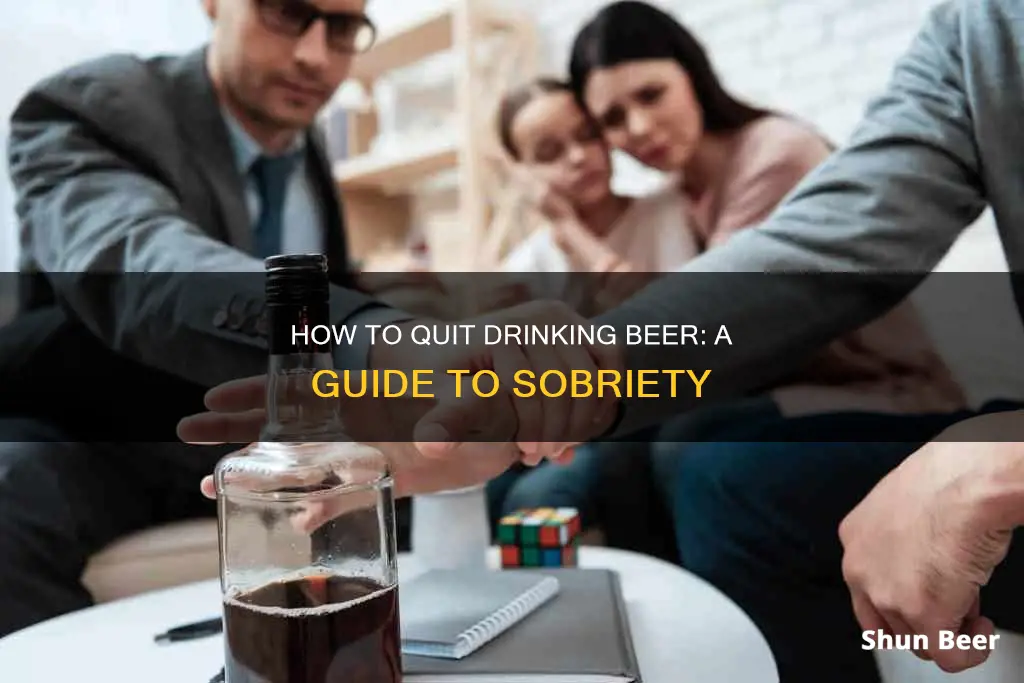
Quitting drinking is a challenging but rewarding endeavour that can bring about significant improvements in one's health, relationships, and overall quality of life. Alcohol consumption, even in moderate amounts, can lead to adverse effects such as impaired judgement, accidents, weight gain, and strained relationships. Recognising the negative impact of alcohol is the first step towards positive change. Understanding one's relationship with alcohol, seeking social support, and making lifestyle changes are crucial in the journey towards reducing or quitting drinking. It is important to be persistent and compassionate towards oneself during this process, as relapses may occur, but they should not deter one from their long-term goal of a healthier life.
| Characteristics | Values |
|---|---|
| Reasons to quit drinking beer | To improve health, sleep better, lose weight, save money, and improve relationships |
| Steps to quit drinking beer | Understand your relationship with drinking, seek social support, practice self-care, and develop new routines |
| Challenges of quitting drinking beer | Alcohol withdrawal symptoms such as anxiety, restlessness, irritability, headaches, and sweating |
| Strategies to quit drinking beer | Set a drinking goal, keep a drink diary, remove alcohol from your environment, choose alcohol-free days, practice saying no, stay busy, and ask for support |
| Benefits of quitting drinking beer | Improved physical and mental health, better sleep, weight loss, clearer skin, improved relationships, and reduced risk of alcohol-related diseases |
What You'll Learn

Recognising a drinking problem
Recognising that you have a drinking problem is the first step towards becoming alcohol-free. Many people with drinking problems cannot tell when their drinking is out of control. You likely have a drinking problem when your body depends on alcohol to function, and your drinking is causing problems with your health, social life, family, or job.
- You are consuming more than the recommended amount of alcohol. According to the National Institute on Alcohol Abuse and Alcoholism (NIAAA), your drinking may be considered risky if you are a man consuming more than five standard drinks on a single day and more than 14 drinks during any given week, or a woman consuming more than four standard drinks per day and more than seven drinks per week.
- You are experiencing negative consequences due to your drinking, such as health problems, relationship issues, or problems at work or school.
- You are unable to control how much or when you drink.
- You feel compelled or have uncontrollable cravings to drink.
- You have built up a "tolerance" to alcohol, meaning that you need to consume increasingly larger amounts to experience the same effects.
- You drink in secret or hide alcohol in unusual places.
- You experience withdrawal symptoms such as nausea, vomiting, shaky hands, and anxiety when you are unable to drink.
- You continue to drink despite negative consequences in your personal or professional life.
- You prefer drinking over other activities and hobbies and spend less time with friends and family.
- You experience blackouts or periods of time when you can't remember what you did or where you were.
If you recognise any of these signs in yourself or someone else, it is important to seek help from a healthcare professional or support group.
Beer Sleeves: Do They Keep Drinks Cool?
You may want to see also

Lifestyle changes to help quit drinking
Quitting drinking can be challenging, but it is possible with some lifestyle changes and support. Here are some strategies that can help you on your journey to quit drinking:
Understand your relationship with alcohol
Take some time to reflect on your drinking habits and identify why you want to quit. Be honest with yourself about how much you drink and any triggers or patterns that lead to excessive drinking. Understanding your relationship with alcohol is an important first step in making a change.
Change your environment
Remove alcohol from your immediate environment, such as your home or places where you typically drink. Find alternative beverages that you enjoy and that can help you resist the urge to drink. Change your routine by engaging in activities that do not involve drinking, especially during times when you would usually drink.
Seek social support
Involve your trusted friends and family members in your journey. Let them know about your decision to quit drinking, and ask for their encouragement and support. Consider joining support groups or recovery programs, such as Alcoholics Anonymous, to connect with others who are also quitting. Having a strong support system can make a big difference in your success.
Practice self-care
Quitting drinking can be stressful, so it's important to prioritize self-care. Eat regular, balanced meals with nutritious foods. Engage in regular physical activity, which can help reduce stress and improve your overall health. Make sure to get enough sleep, as adequate rest can help you manage cravings and improve your overall well-being.
Manage triggers and urges
Identify and avoid people, places, or situations that trigger your urge to drink. Develop a plan to handle cravings and practice refusal skills. Distract yourself by engaging in activities you enjoy or trying out new hobbies. Find healthy coping mechanisms to manage stress, anxiety, or other difficult emotions, such as deep breathing, meditation, or reaching out to a loved one.
Seek professional help if needed
If you are experiencing alcohol dependence or withdrawal symptoms, it is important to seek professional help. Talk to your healthcare provider or a substance abuse therapist, who can guide you through the process and provide medical support if needed. They may also refer you to support groups or counseling services. Remember, you don't have to go through this alone, and it's okay to ask for help.
Beer and Bone Loss: How Beer Affects Your Mouth Health
You may want to see also

Understanding the health effects of alcohol
Alcohol is a drug that slows down the messages between your brain and your body. It is a depressant, which means it slows down the messages sent between your central nervous system and your body. This can prevent your body from functioning properly.
Alcohol can cause both short-term and long-term effects on your health. Even drinking moderately can leave you feeling groogy, foggy, or hungover. The more you drink, the more likely you are to notice other health effects.
Short-term effects of alcohol
Temporary effects you might notice while drinking alcohol or shortly afterward can include:
- Feelings of relaxation or drowsiness
- A sense of euphoria or giddiness
- Slowed or slurred speech
- Changes in hearing, vision, and perception
- Loss of coordination
- Trouble focusing or making decisions
- Loss of consciousness or gaps in memory (often called a blackout)
Long-term effects of alcohol
Alcohol use can also lead to more lasting concerns that extend beyond your mood and health. Some long-term effects of frequent alcohol consumption include:
- Persistent changes in mood, including anxiety and irritability
- Insomnia and other sleep concerns
- A weakened immune system, meaning you might get sick more often
- Changes in libido and sexual function
- Changes in appetite and weight
- Problems with memory and concentration
- Difficulty focusing on tasks
- Increased tension and conflict in romantic and family relationships
Alcohol's physical effects on the body
Digestive and endocrine glands
Drinking too much alcohol over time may cause inflammation of the pancreas, resulting in pancreatitis. Pancreatitis can activate the release of pancreatic digestive enzymes and cause abdominal pain.
Liver
Your liver helps break down and remove toxins and harmful substances, including alcohol, from your body. Long-term alcohol use interferes with this process and increases your risk for alcohol-related liver disease and chronic liver inflammation.
Central nervous system
Slurred speech, a key sign of intoxication, happens because alcohol reduces communication between your brain and body. This makes speech and coordination more difficult.
Circulatory system
Complications include difficulty pumping blood through the body and absorbing vitamins and minerals from food, which can cause fatigue and anemia.
Sexual and reproductive health
Drinking alcohol can lower your inhibitions, but heavy drinking can prevent sex hormone production, keep you from getting or maintaining an erection, and make it difficult to achieve orgasm. Excessive drinking may affect your menstrual cycle and potentially increase your risk for infertility.
Skeletal and muscle systems
Long-term alcohol use can affect bone density, leading to thinner bones and increasing your risk of fractures if you fall. Weakened bones may also heal more slowly. Drinking alcohol can also lead to muscle weakness, cramping, and eventually atrophy.
Alcohol and cancer
According to the National Cancer Institute, there is a strong scientific consensus that alcohol drinking can cause several types of cancer. Even those who have no more than one drink per day and people who binge drink have a modestly increased risk of some cancers.
Beer and Kidney Infections: Is There a Link?
You may want to see also

Detox and withdrawal symptoms
Quitting drinking can be challenging, and the withdrawal symptoms can range from mild to severe, lasting anywhere from a few days to several weeks. It is important to consult a healthcare professional if you plan to quit drinking, especially if you have been a heavy drinker. They can provide guidance and support throughout the process.
- Mild symptoms can start as early as 6 hours after your last drink. These may include increased anxiety, a racing pulse, nausea, vomiting, shaky hands, and cold sweats.
- More serious problems can occur within 12-48 hours after quitting, including hallucinations and seizures.
- Delirium tremens (DTs) are severe symptoms that usually occur 48-72 hours after quitting. They include vivid hallucinations and delusions and affect about 5% of people experiencing alcohol withdrawal.
- Other symptoms that may occur during the withdrawal process include insomnia, high blood pressure, increased heart rate, chest pain, night sweats, tremors, confusion, and mood swings.
- Cravings for alcohol can be intense and persist for several days or even weeks after quitting. This is the psychological aspect of withdrawal, which can be just as challenging as the physical symptoms.
It is important to note that everyone's experience with detox and withdrawal will be unique. The severity and duration of symptoms depend on various factors, including the amount and frequency of alcohol consumption, individual health factors, and whether there have been previous episodes of withdrawal.
To manage detox and withdrawal symptoms, it is recommended to:
- Seek medical advice and supervision throughout the process. A healthcare professional can provide guidance, prescribe medications if needed, and address any underlying health conditions.
- Prepare for potential detox symptoms by understanding your relationship with alcohol and creating a plan to manage cravings and triggers.
- Remove alcohol from your environment to avoid temptation and make it easier to resist cravings.
- Stay busy and distract yourself with activities, especially those that get you out of the house and moving.
- Practice self-care by eating regular, balanced meals, getting enough sleep, and finding healthy hobbies to distract yourself and manage stress.
- Reach out for support from family, friends, support groups, or a therapist. It is important to have a strong support system during this challenging time.
Sportsbook Beer: BYOB or Casino Rules?
You may want to see also

Support systems to help quit drinking
Yes, it is possible to quit drinking beer. However, it is important to recognize that you have a drinking problem and seek support. Here are some support systems to help you quit drinking:
- Talk to a healthcare professional: Your primary healthcare provider can be a great first step in getting help. They can refer you to a therapist or counsellor, prescribe medications, and provide treatment referrals. They can also help you evaluate your drinking pattern, craft a treatment plan, assess your overall health, and determine if medications are appropriate.
- Mutual-Support Groups: Support groups such as Alcoholics Anonymous (AA) or SMART Recovery provide peer support for people quitting or cutting back on their drinking. These groups offer valuable added layers of support, teaching people about alcohol use and its effects, offering counselling, and providing a safe space to talk with others who have drinking problems.
- Family and Friends: Letting your family and friends know about your decision to stop drinking can help you stick to your goal. They can provide encouragement and support, and you may also encourage them to examine their drinking habits. It is often easier to turn down a drink when you have a trusted support person with you at events that involve alcohol.
- Employee Assistance Programs (EAPs): Your workplace may offer an employee assistance program to help employees with personal issues, including alcohol use.
- Online Support Groups and Apps: If you prefer more anonymity, you can join online support groups or use apps specifically designed to help you quit drinking. These apps offer various features such as virtual communities, coaching, health and money trackers, and milestone notifications to help you stay motivated and connected.
- Intensive Rehabilitation: If you have a medium or high level of alcohol dependence, you may need intensive rehabilitation. This can involve attending a programme of intensive support in your community or residential rehabilitation services.
Exploring the Legal Drinking Age: Beer and the Law
You may want to see also
Frequently asked questions
Yes, it is possible to quit drinking beer. However, it is important to consult a doctor or a healthcare professional, especially if you think you may be dependent on alcohol. They can help you decide whether it is best to cut back or abstain and provide guidance and support.
Quitting drinking can have several benefits for your health and overall well-being. It can improve your relationships, sleep, energy levels, and mood. You may also experience weight loss, clearer skin, and better heart health. Additionally, quitting drinking can reduce your risk of developing alcohol-related cancers, liver disease, and heart disease or stroke.
One of the main challenges of quitting drinking is managing cravings and urges to drink. Identifying triggers, such as certain people, places, or situations, and finding alternative ways to cope with stress or emotions can help. Withdrawal symptoms, such as anxiety, restlessness, irritability, headaches, and sweating, are also common, especially for heavy drinkers or those dependent on alcohol. In severe cases, medical support may be required.
Here are some strategies to increase your chances of success:
- Understand your relationship with alcohol and identify your reasons for quitting.
- Set clear goals and make a plan for how you will quit.
- Remove alcohol from your home and avoid places or situations that trigger your drinking.
- Find alternative drinks and hobbies to replace drinking.
- Practice saying "no" to offers of drinks and let your friends and family know about your decision to quit.
- Seek social support from trusted friends and family, support groups, or professional therapy.







